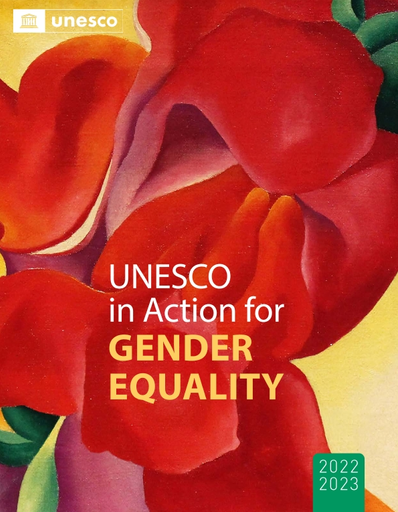Blog of Rina Dupriet, SI UN Representative at UNESCO.
The global crises we have been witnessing for several years show us the extent to which we need to find structural solutions that allow us to build and shape sustainable and peaceful societies.
None of these interrelated crises can be solved by a single country and none of them are gender-neutral! That is why, by putting gender equality at the heart of multilateral action, it is possible to harness the talents, ingenuity and visions of the other half of the world’s population to bring about the mindset change that is needed today.
Thus, on November 7, 2023, during the 42nd session of UNESCO’s General Conference, a panel was held in which I participated at UNESCO headquarters in order to take stock of its actions.
There is no shortage of challenges
Let’s mention a few of them, which our societies today will have to face:
- Education has experienced the greatest disruption in history due to the health crisis of the Covid-19 pandemic;
- Loss of terrestrial and marine biodiversity has accelerated at an alarming rate;
- Conflict and emergencies have destabilised progress towards just and peaceful societies;
- Human rights abuses have increased over the years.
Decisions taken today will therefore have sometimes irreversible consequences for future generations.
UNESCO in action for gender equality
On the occasion of the General Conference in November 2023, the Assistant Director-General for Education Stefania Giannini and the Assistant Director-General for Social and Human Sciences Gabriela Ramos presented her Report:
“UNESCO in Action for Gender Equality 2022-2023“
This report presents the actions implemented by UNESCO in 2022 and 2023 to advance gender equality in all fields and proposes a roadmap for gender-transformative work.
Containing key data, good practices and many lessons, this report shows how UNESCO is working with its partners to promote gender equality and the empowerment of women and girls through education, science, culture, communication and information around the world.
This report also highlights UNESCO’s global leadership on a series of crucial issues to advance gender equality, including girls’ education, the ethical development of artificial intelligence, the protection of women journalists, artists and scientists in conflict situations, and the promotion of women at the forefront of scientific innovation in order to contribute to the resolution of the climate and ecosystem crises.
In the face of persistent global threats of a backlash against the human rights of women and girls, UNESCO works globally and nationally to implement its mandate and vision to advance gender equality.
Several experiments highlighted
During this side event to the General Conference, the Director of the Division for Gender Equality Begonia Lasagabaster wished to present experiences in the field that are currently being practiced in a number of countries.
Theme: Building the resilience and empowerment of women and girls
- Hamida Aman, journalist and founder of Radio Begum, develops and broadcasts educational content by and for women in Afghanistan;
- Candida Jimenez Bojorquez, embroiderer from Mani, develops a gender perspective through textile art in Yucata, Mexico;
- Halleluya Naantu Ekandjo, geologist and environmental scientist, Restore in Namibia.
Theme : Diversifying Narratives to Reshape Harmful, Social and Gender Norms
- Jack Chishala, Deputy Director of Curriculum Development at the Ministry of Education in Zambia to End Violence in Schools;
- Judith Dipodiputo, member of the Indonesian Film Board to create guidelines on gender equality and social inclusion in the film industry;
- Mohamed Outahar, Professor and researcher in sociology at the National Institute of Social Action to transform mentalities in Morocco.
These testimonies illustrate the transformative impact of UNESCO’s initiatives to empower women and girls around the world.
The global gender focus is more relevant than ever. It needs to be expanded to multiply gender-transformative outcomes for women, girls, men and boys around the world.


